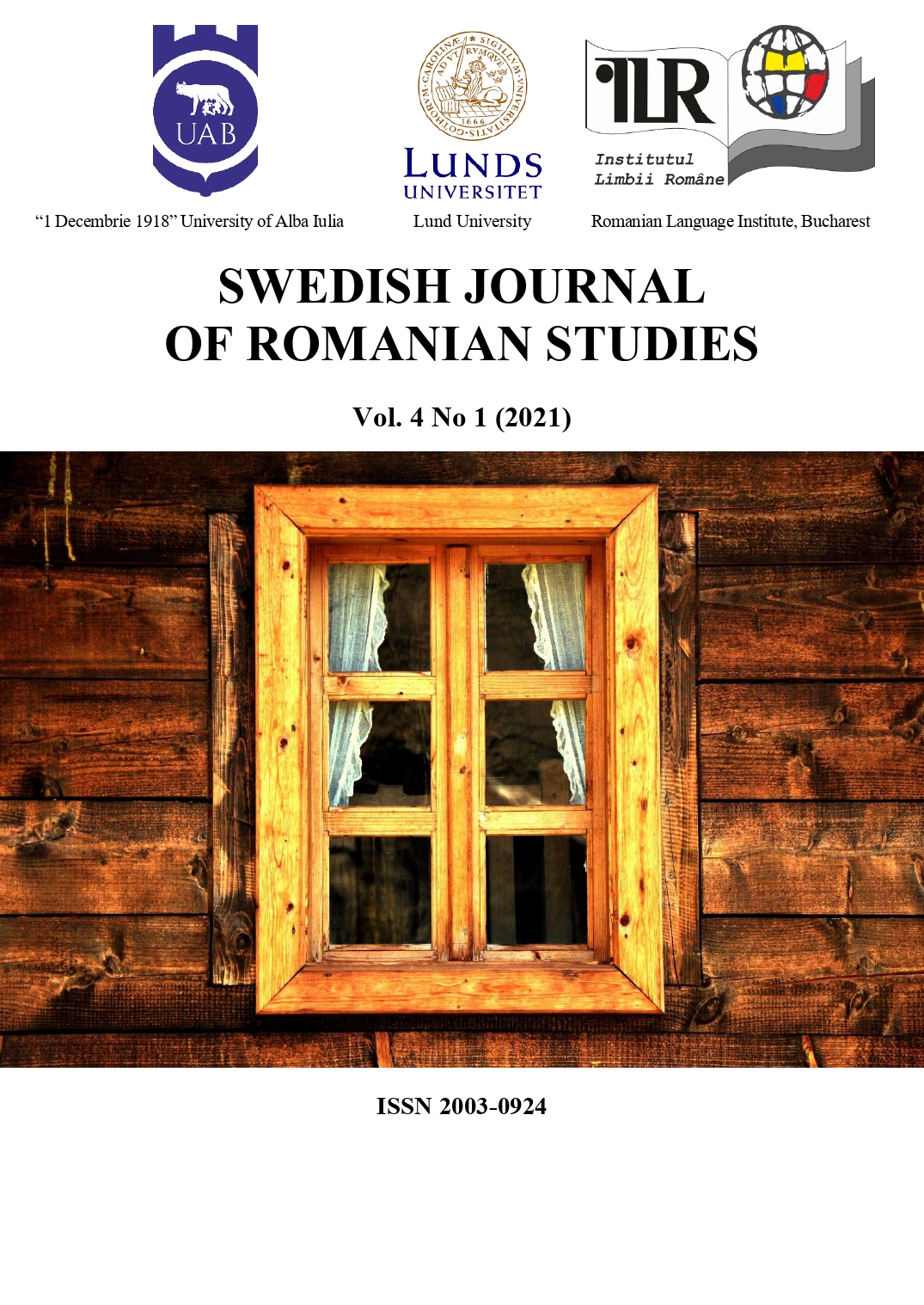Le désir de langue. Les dimensions poétique et politique de la diglossie dans le roman « Le jardin de verre » de Tatiana Țîbuleac
The desire for language. The poetic and political dimensions of diglossia in the novel “The Glass Garden” by Tatiana Țîbuleac
DOI:
https://doi.org/10.35824/sjrs.v4i1.22481Keywords:
diglossia; poetics; identity; subjectivation; ȚîbuleacAbstract
Still relevant today via mobility and the multicultural environment as the constitutive elements of our globalized societies, the reflections around “the cumbersome problem of the genius of languages” (Cassin 2016) join and enrich the question of living together and building oneself. In the field of literature or human sciences, the thought of the practice of languages in a situation of diglossia has forged an imaginary which often connects the passage from one language to another to a balance of power and a tension of identity. We propose an analysis of the symbolic values of the dilemma between the Romanian language and the Russian language which is at the heart of the diegesis of the novel Grădina de sticlă [The Glass Garden] by Tatiana Țîbuleac. Published in Romanian by Éditions Cartier de Chișinău and translated into several languages, including French and Spanish, the book was awarded the European Union Prize for Literature in 2019. The fictional world and the language of writing describe a symbolic abyss: the author describes in Romanian the fight with the Russian of a Moldovan orphan who is trying to rebuild herself between the two languages. In a very colorful style, the novel deploys a po(ï)etics of “between”, which also has a political dimension.
References
Cioran, E. (1997). Cahiers 1957-1972/ Notebooks 1957-1972. Paris : Gallimard.
Cioran, E. (2011). Œuvres/ Complete works. Paris : Gallimard.
Deleuze, G; Guattari, F. (1980). Mille plateaux/ A Thousand Plateaus. Paris : Minuit.
Rainier, G. (2003). Bilinguisme et diglossie : comment penser la différence linguistique dans les littératures francophones/ Bilingualism and diglossia: how to think about the linguistic difference in French-speaking literatures. In Lieven D’hulst et Jean-Marc Moura, (dir.) Les études littéraires francophones : état des lieux. Lille : Presses Universitaires de Lille, 113-126.
Baștovoi, S. (2018). Les Enseignements d’une ex-prostituée à son fils handicapé/ The Teachings of an Ex-Prostitute to Her Disabled Son. Paris : Jacqueline Chambon/Actes Sud.
Casanova, P. (2015). La Langue mondiale. Traduction et domination/ The World language. Translation and domination. Paris : Seuil, Coll. Liber.
Cassin, B. (2016). Eloge de la traduction. Compliquer l’universel/ Praise of translation. Complicating the universal. Paris : Fayard.
Cassin, B. (2020). Le bonheur, sa dent douce à la mort. Autobiographie philosophique/ Happiness, her sweet tooth to death. Philosophical autobiography. Paris : Fayard.
Ciocan, I. (2017). Le Royaume de Sasha Kozak/ Sasha Kozak’s Kingdom. Paris : Belleville.
Deleuze, G. (1969). Logique du sens/ Logic of Sense. Paris : Minuit.
Derrida, J. (2005). Apprendre à vivre enfin. Entretien avec Jean Birnbaum/ Learning to live. A conversation with Jean Birnbaum. Paris : Galilée.
Hjelmslev, L. (2000). Prolégomènes à une théorie du langage : La Structure fondamentale du langage/ Prolegomena to a Theory of Language : The Basic Structure of Language. Paris : Minuit.
Hjelmslev, L. (1984). Le langage : une introduction/ Language : An Introduction. Paris : Minuit.
Meschonnic, H. (1999). Poétique du traduire/ Poetics of translating. Lagrasse : Verdier.
Prieur, J.-M. (2006). Contact de langues et positions subjectives/ Languages. Contacts and Subjective Positions. In Langage et société 2006/ 2, n° 116, 11-118. https://doi.org/10.3917/ls.116.0111 consulté le 20.01.2021
Rivarol (1998). Discours sur l’universalité de la langue française/ Speech on the universality of the French language. In Pensées diverses. Verrièrres-le-Buisson : Desjonquères, 102-157.
Țîbuleac, T. (2017). Vara în care mama a avut ochii verzi/ The Summer when Mother had Green Eyes. Chișinău: Cartier.
Țîbuleac, T. (2018). L’été où maman a eu les yeux verts. Genève : Syrtes.
Țîbuleac, T. (2018). Grădina de sticlă/ The Glass Garden. Chișinău: Cartier.
Țîbuleac, T. (2020). Le jardin de verre/ The Glass Garden. Genève : Syrtes.
Wismann, H. (2012). Penser entre les langues/ Think Between Languages. Paris : Albin Michel.
Downloads
Published
How to Cite
Issue
Section
License
Copyright (c) 2021 Cristina Hermeziu

This work is licensed under a Creative Commons Attribution-NonCommercial 4.0 International License.
Authors who publish with this journal agree to the following terms:
a. Authors retain copyright and grant the journal right of first publication with the work simultaneously licensed under a Creative Commons Attribution-NonCommercial 4.0 International License that allows others to share the work with an acknowledgement of the work's authorship and initial publication in this journal.
b. Authors are able to enter into separate, additional contractual arrangements for the non-exclusive distribution of the journal's published version of the work (e.g., post it to an institutional repository or publish it in a book), with an acknowledgement of its initial publication in this journal.
c. Authors are permitted and encouraged to post their work online (e.g., in institutional repositories or on their website) prior to and during the submission process, as it can lead to productive exchanges, as well as earlier and greater citation of published work (See The Effect of Open Access).

